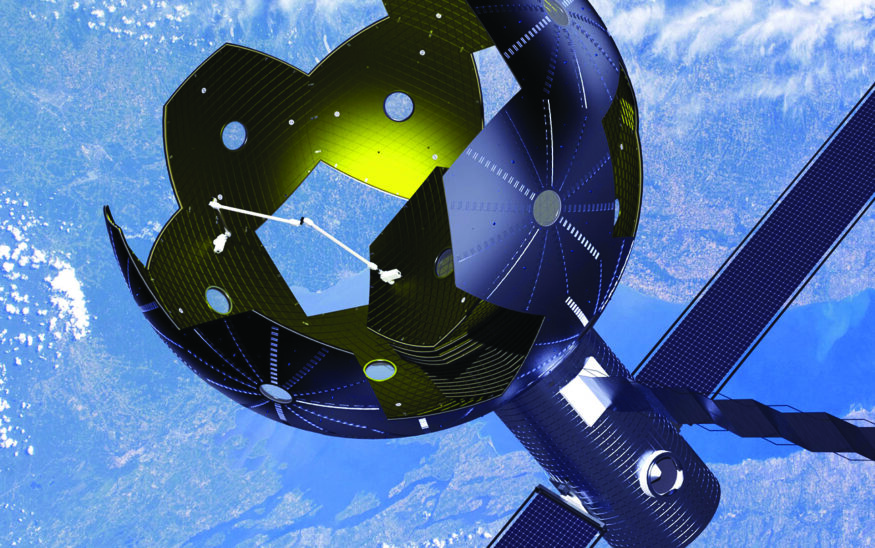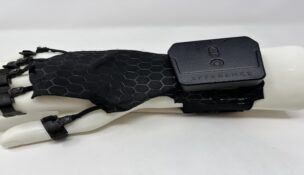Tech Startup: ThinkOrbital — Infrastructure For outer space
ThinkOrbital’s market includes government entities like NASA and Space Force as well as companies involved in space tourism, pharmaceutical manufacturing and orbital debris remediation.
Eric Peterson //October 20, 2023//


Tech Startup: ThinkOrbital — Infrastructure For outer space
ThinkOrbital’s market includes government entities like NASA and Space Force as well as companies involved in space tourism, pharmaceutical manufacturing and orbital debris remediation.
Eric Peterson //October 20, 2023//
ThinkOrbital
WHERE: Lafayette, CO
WEBSITE: www.thinkorbital.com
FOUNDED: 2021
INITIAL LIGHTBULB
Co-founder and president Lee Rosen retired as a colonel in the U.S. Air Force in 2011 and embarked on a career in the commercial space sector. After a decade with SpaceX, Rosen came together with ThinkOrbital co-founders CEO Sebastian Asprella and CTO Vojtech Holub, Ph.D., to develop Holub’s idea for infrastructure in outer space.
Now with about 10 employees, the company is based at a space-centric facility called Tycho Station in Lafayette. Rosen says he anticipates hiring in 2023 but doesn’t see recruitment as a hurdle: “Everyone wants to move to Colorado. It’s not like Los Angeles or Florida.”
IN A NUTSHELL
The legacy method of manufacturing orbital infrastructure is strictly terrestrial. “Everything is built on the ground,” Rosen says. “You’re constrained by the volume of the rocket.
“It’s like trying to build the Empire State Building in New Jersey, putting it on a truck and taking it to New York City. It makes absolutely no sense. You want to build big infrastructure where you need it.”
The bottom line: Rosen says ThinkOrbital could launch the equivalent volume of four International Space Stations on a single rocket in the form of its spherical ThinkPlatform. “If you imagine a soccer ball made up of pentagons and hexagons, and you were able to take those pentagons and hexagons and stack them flat, IKEA-style, you could get a lot more material in a much smaller volume,” he explains. “What we do on orbit is essentially re-assemble that soccer ball. We do that by taking that flat pack and using precision robotics and latches to align large pentagons and hexagons. That gives it its basic structure, and then the special sauce is actually welding that structure together to make it a rigid, pressurizable structure in space.”
In the near term, the company is developing tools for welding, cutting and additive manufacturing in space. “Eventually, we’ll use that toolkit to build large infrastructure in space,” Rosen says.
Case in point: ThinkPlatform 1 would be a module attached to an existing space station to prove the concept, then ThinkPlatform 2 would be a free-flying spacecraft, likely to demonstrate in-space manufacturing. “ThinkPlatform 3 is the future with a pressurized human-habitable volume for NASA or in-space manufacturing of space tourism,” Rosen says.
Rosen says he expects demonstration missions of the company’s welding and cutting tools by mid-2024 before their market debut in 2025 or 2026, followed by ThinkPlatform 1 in 2027 or 2028. “It’s not a 20-year project,” Rosen says.
Brandon Shelton, founder of Charlotte, North Carolina-based TFX Capital, says Rosen’s background with the Air Force and SpaceX was a big part of the decision to invest in ThinkOrbital. “We’re really looking for resilience, that ‘been there, done that’ sort of thing,” Shelton says.
With the International Space Station set to be decommissioned in 2031, there’s a big opening. “You have to have options,” Shelton says. “What is the next step for having space in space?”
READ: Tech Startup — Skyhook Solar: Solar-powered Charging Stations for E-bikes and Electric Cars
THE MARKET
ThinkOrbital’s market includes government entities like NASA and Space Force as well as companies involved in space tourism, pharmaceutical manufacturing and orbital debris remediation.
“Our near-term focus is on building this toolkit so you can actually do this type of construction in outer space,” Rosen says. “We want to be able to sell the toolkit first, whether it’s a welder, a cutter, or an inspection capability.”
FINANCING
The company has received two grants totaling more than $800,000 of cash and incentives from the Colorado Office of Economic Development and International Trade as it raised a pre-seed funding round in 2023.
Rosen says ThinkOrbital will subsequently pursue a seed round of about $9 million after its first demonstration missions.
 Denver-based writer Eric Peterson is the author of Frommer’s Colorado, Frommer’s Montana & Wyoming, Frommer’s Yellowstone & Grand Teton National Parks and the Ramble series of guidebooks, featuring first-person travelogues covering everything from atomic landmarks in New Mexico to celebrity gone wrong in Hollywood. Peterson has also recently written about backpacking in Yosemite, cross-country skiing in Yellowstone and downhill skiing in Colorado for such publications as Denver’s Westword and The New York Daily News. He can be reached at [email protected]
Denver-based writer Eric Peterson is the author of Frommer’s Colorado, Frommer’s Montana & Wyoming, Frommer’s Yellowstone & Grand Teton National Parks and the Ramble series of guidebooks, featuring first-person travelogues covering everything from atomic landmarks in New Mexico to celebrity gone wrong in Hollywood. Peterson has also recently written about backpacking in Yosemite, cross-country skiing in Yellowstone and downhill skiing in Colorado for such publications as Denver’s Westword and The New York Daily News. He can be reached at [email protected]

























